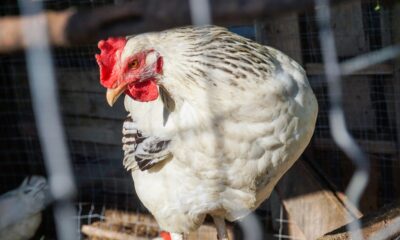Raising backyard chickens has become increasingly popular in recent years, thanks to the numerous benefits they offer. From a sustainable source of fresh eggs to natural pest control in the garden, chickens can be a valuable addition to any home. If you’re considering starting your own flock, this guide will walk you through everything you need to know to get started. Introduction to Backyard Chickens Benefits of raising chickens There are many advantages to keeping chickens in your backyard. Not only do they provide a sustainable source of fresh eggs, but they also offer natural fertilizer for your garden and can help control pests like slugs and snails. Additionally, chickens are excellent pets with unique personalities that can bring joy to your family. What to consider before starting Before diving into chicken-keeping, it’s essential to consider factors such as local regulations, available space, and your level of commitment. Raising chickens requires daily care and attention, so it’s crucial to ensure you have the time and resources to devote to your flock. Choosing the Right Chicken Breeds Factors to consider When selecting chicken breeds for your backyard flock, consider factors such as egg production, temperament, and climate suitability. Some breeds are better suited for colder climates, while others thrive in warmer regions. Additionally, consider whether you want chickens primarily for egg production, meat, or as pets. Popular beginner-friendly breeds For novice chicken keepers, some breeds are particularly well-suited due to their docile nature and ease of care. Popular beginner-friendly breeds include Rhode Island Reds, Australorps, and Plymouth Rocks. These breeds are known for their excellent egg production and gentle dispositions, making them ideal for beginners. Setting Up Your Chicken Coop Design considerations A well-designed chicken coop is essential for the health and safety of your flock. When designing your coop, consider factors such as ventilation, predator protection, and easy access for cleaning. Additionally, ensure your coop has adequate space for the number of chickens you plan to keep. Essential features of a coop Key features of a chicken coop include roosting bars for sleeping, nesting boxes for egg-laying, and secure doors to keep predators out. It’s also important to provide plenty of bedding material for insulation and comfort, as well as perches and enrichment toys to keep your chickens entertained. Feeding and Nutrition Proper diet for chickens A balanced diet is crucial for the health and well-being of your chickens. Commercial chicken feed is formulated to meet all of their nutritional needs, but you can also supplement their diet with kitchen scraps, vegetables, and occasional treats like mealworms or scratch grains. Make sure your chickens always have access to clean, fresh water. Common feeding mistakes to avoid Avoid feeding your chickens foods that are toxic to them, such as avocado, chocolate, and raw beans. Additionally, be cautious with treats high in salt or sugar, as they can lead to health problems like obesity or kidney disease. It’s also essential to provide grit to help chickens digest their food properly. Caring for Your Chickens Daily care routine Chickens require daily care, including checking for eggs, refilling food and water containers, and cleaning the coop. Spend time interacting with your chickens to monitor their health and behavior, as early detection of issues can prevent more serious problems later on. Health checks and common issues Regular health checks are essential for identifying and addressing any potential issues with your flock. Watch for signs of illness such as lethargy, decreased appetite, or abnormal droppings. Common health problems in chickens include parasites, respiratory infections, and egg-binding. Understanding Egg Production Factors affecting egg production Several factors can impact egg production in chickens, including age, breed, nutrition, and daylight hours. Most hens will start laying eggs around six months of age and will continue laying for several years, with peak production occurring in the first two years. Maximizing egg yield To maximize egg production, ensure your chickens have access to a high-quality diet with plenty of protein and calcium. Provide a comfortable and stress-free environment, with adequate nesting boxes and roosting space. Additionally, ensure your chickens receive at least 14 hours of daylight per day, either naturally or with supplemental lighting. Handling Chicken Waste Importance of waste management Proper waste management is essential for maintaining a clean and healthy environment for your chickens. Accumulated waste can attract pests and pathogens, leading to disease outbreaks and unpleasant odors. Regularly cleaning the coop and disposing of waste responsibly is key to preventing these issues. Eco-friendly disposal methods Instead of throwing chicken waste in the trash, consider composting it to create nutrient-rich fertilizer for your garden. Chicken manure is high in nitrogen and other essential nutrients, making it an excellent soil amendment. Just be sure to compost it properly to avoid odor and pathogens. Dealing with Predators Identifying common predators Predators such as foxes, raccoons, and hawks pose a significant threat to backyard chickens. Learn to recognize the signs of predator activity, such as missing eggs or feathers, and take steps to protect your flock accordingly. Strategies for predator-proofing your coop To protect your chickens from predators, reinforce your coop with sturdy fencing, secure locks, and predator-proof hardware cloth. Keep vegetation trimmed away from the coop to eliminate hiding spots for predators, and consider installing motion-activated lights or alarms as an additional deterrent.

 ENTERTAINMENT8 months ago
ENTERTAINMENT8 months ago
 ENTERTAINMENT1 month ago
ENTERTAINMENT1 month ago
 Livestock1 year ago
Livestock1 year ago
 Poultry1 year ago
Poultry1 year ago
 Livestock1 year ago
Livestock1 year ago
 Poultry1 year ago
Poultry1 year ago
 Livestock1 year ago
Livestock1 year ago
 Poultry1 year ago
Poultry1 year ago